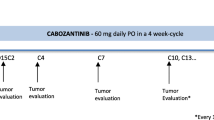Abstract
Purpose
Bevacizumab is the only therapeutic target approved for patients with persistent, recurrent or advanced cervical cancer from a phase III study that combined with chemotherapy; it proves a significant increase in overall survival. To retrospectively assess the efficacy and safety of bevacizumab as the first-line treatment in patients from usual clinical practice with recurrent/persistent or advanced cervical cancer.
Patients and methods
Treatment consisted of cisplatin 50 mg/m2 or carboplatin AUC 5 plus paclitaxel 175 mg/m2 for 6–8 cycles and bevacizumab 15 mg/kg every 3 weeks up to progression or unacceptable toxicity. The endpoints were progression-free survival (PFS), overall survival (OS), response rates (RR) and toxicity.
Results
Twenty-seven patients were included from January 2014 to June 2017, with a median follow-up 10, 1 months. Eleven percent had recurrent/persistent disease and 89% had metastatic disease at diagnosis. The prior exposition to platinum was 70%. The median PFS and OS were 9, 6 and 21, 5 months, respectively. There was an increase of fistula formation (22%). All of them had pelvic and peritoneal disease at the beginning of treatment and previous treatment with chemoradiotherapy; non-incidence differences were found according to the type of platinum agent used. There were two treatment-related deaths, one from intestinal perforation and another from severe sepsis.
Conclusion
Finally, although our study does have certain limitations, we believe that it can provide useful information and encouraging evidence that the routine use of bevacizumab as part of first-line treatment of patients with advanced cervical cancer may be associated with outcomes comparable with those obtained in GOG240 study.

Similar content being viewed by others
References
Thigpen T, Shingleton H, Homesley H, et al. cis-Dichlorodiammineplatinum (II) in the treatment of gynecologic malignancies: phase II trials by the Gynecologic Oncology Group. Cancer Treat Rep. 1979;63:1549–55.
Moore DH, Blessing JA, McQuellon RP, et al. Phase III study of cisplatin with or without paclitaxel in stage IVB, recurrent, or persistent squamous cell carcinoma of the cervix: a Gynecologic Oncology Group study. J Clin Oncol. 2004;22:3113–9.
Long HJ III, Bundy BN, Grendys EC Jr, et al. Randomized phase III trial of cisplatin with or without topotecan in carcinoma of the uterine cervix: a Gynecologic Oncology Group Study. J Clin Oncol. 2005;23:4626–33.
Monk BJ, Sill MW, McMeekin DS, et al. Phase III trial of four cisplatin-containing doublet combinations in stage IVB, recurrent, or persistent cervical carcinoma: a Gynecologic Oncology Group study. J Clin Oncol. 2009;27:4649–55.
Wright JD, Viviano D, Powell MA, et al. Bevacizumab combination therapy in heavily pretreated, recurrent cervical cancer. Gynecol Oncol. 2006;103(2):489–93.
Monk BJ, Sill MW, Burger RA, Gray HJ, Buekers TE, Roman LD. Phase II trial of bevacizumab in the treatment of persistent or recurrent squamous cell carcinoma of the cervix: a Gynecologic Oncology Group Study. J Clin Oncol. 2009;27(7):1069–74.
Zighelboim I, Wright JD, Gao F, et al. Multicenter phase II trial of topotecan, cisplatin and bevacizumab for recurrent or persistent cervical cancer. Gynecol Oncol. 2013;130:64–8.
Tewari KS, Sill MW, Long HJ 3rd, et al. Improved survival with bevacizumab in advanced cervical cancer. N Engl J Med. 2014;370:734–43.
Tewari KS, Sill MW, Penson RT, et al. Final overall survival analysis of the phase III randomized trial of chemotherapy with and without bevacizumab for advanced cervical cancer: a NRG Oncology-Gynecologic Oncology Group study. Madrid, Spain: Proffered Paper Session presented at European Society for Medical Oncology; 28 Sept 2014.
Minion LE, Bai J, Monk BJ, Robin Keller L, et al. A markov model to evaluate cost-effectiveness of antiangiogenesis therapy using bevacizumab in advanced cervical cancer. Gynecol Oncol. 2015;137(3):490–6. https://doi.org/10.1016/j.ygyno.2015.02.027.
Parkinson B, Viney R, Haas M, et al. Real-world evidence: a comparison of the Australian herceptin program and clinical trials of trastuzumab for HER2-positive metastatic breast cancer. Pharmacoeconomics. 2016;34(10):1039–50. https://doi.org/10.1007/s40273-016-0411-2.).
Rothwell PM. Factors that can affect the external validity of randomised controlled trials. PLoS Clin Trials. 2006;1(1):e9.
Rothwell PM. External validity of randomised controlled trials: “to whom do the results of this trial apply?”. Lancet. 2005;365(9453):82–93.
Garrison LP Jr, Neumann PJ, Erickson P, et al. Using real-world data for coverage and payment decisions: the ISPOR real-world data task force report. Value Health. 2007;10(5):326–35.
Annemans L, Aristides M, Kubin M. Real-life data: a growing need. ISPOR Connect. 2007;13(5):8–12.
Haemmerle M, Bottsford-Miller J, Pradeep S, et al. FAK regulates platelet extravasation and tumor growth after antiangiogenic therapy withdrawal. J Clin Invest. 2016;126(5):1885–96. https://doi.org/10.1172/JCI85086 (Epub 2016 Apr 11).
Tewari KS, Sill MW, Penson RP, et al. Bevacizumab for advanced cervical cancer: final overall survival and adverse event analysis of a randomised, controlled, open-label, phase 3 trial (Gynecologic Oncology Group 240). Lancet. 2017;390(10103):1654–63.
Moore DH, Tian C, Monk BJ, et al. Prognostic factors for response to cisplatin-based chemotherapy in advanced cervical carcinoma: a Gynecologic Oncology Group Study. Gynecol Oncol. 2010;116:44–9.
Tewari KS, Sill MW, Monk BJ, et al. Prospective validation of pooled prognostic factors in women with advanced cervical cancer treated with chemotherapy with and without bevacizumab: a NRG Oncology/Gynecologic Oncology Group Study. Clin Cancer Res. 2015;21:5480–7.
Author information
Authors and Affiliations
Corresponding author
Ethics declarations
Conflict of interest
The authors declare that they have no potential conflicts of interest.
Ethical approval
All procedures performed in studies involving human participants were in accordance with the ethical standards of the institutional and/or national research committee and with the 1964 Helsinki declaration and its later amendments or comparable ethical standards.
Informed consent
Informed consent was obtained from all individual participants included in the study.
Rights and permissions
About this article
Cite this article
Godoy-Ortiz, A., Plata, Y., Alcaide, J. et al. Bevacizumab for recurrent, persistent or advanced cervical cancer: reproducibility of GOG 240 study results in “real world” patients. Clin Transl Oncol 20, 922–927 (2018). https://doi.org/10.1007/s12094-017-1808-x
Received:
Accepted:
Published:
Issue Date:
DOI: https://doi.org/10.1007/s12094-017-1808-x




